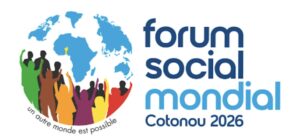FREE FLOW OF INFORMATION
Articles from Peace Magazine and Habitat International Coalition
Next year’s World Social Forum (WSF) will take place August 4–8 in Cotonou, the capital of Benin. It will mark the seventeenth edition of the global gathering since the first was held in Porto Alegre, Brazil, in 2001. The Benin forum represents a revival of African civil society, which has struggled in recent years”.

Unlike the corporate-driven World Economic Forum (WEF) in Davos, the WSF has always positioned itself as its counterpoint: a space for grassroots movements, activists, and civil society organizations (CSOs) to network across borders, debate urgent global issues, and share alternative visions for development.
This time, the spotlight falls on Benin, a small West African nation tasked by the WSF International Board with hosting duties. Civil society groups in the region lobbied hard for it, securing government backing—and even commitments to expand the Cotonou airport and other infrastructure— to accommodate the expected flood of participants.
For many, the Benin forum represents a revival of African civil society, which has struggled in recent years under political repression, funding shortages, and organizational challenges. Previous WSFs in Africa were held in Mali (2006), Kenya (2007), Senegal (2011), and Tunisia (2013). But why choose Benin, a relatively small and little-known state among Africa’s 54 countries?
The answer lies partly in its geography and history. Benin—home to 15 million people—sits between Nigeria, Burkina Faso, Niger, and Togo. To the north, Burkina Faso, Niger, and Mali have banded together as the Alliance of Sahel States (AES), a bloc of military-led governments gaining notoriety for their populist stances, anti-French rhetoric, and growing alignment with Russia.
(Article continued in right column)
World Social Forums, Advancing the Global Movement for a Culture of Peace?
(Article continued from left column)
By contrast, Benin’s story is one of peaceful transition. The country moved from a MarxistLeninist regime to a multiparty democracy, and today boasts more than 300 active NGOs across sectors. For advocates, it’s a promising setting at a moment when Africa is asserting more autonomy and experimenting with indigenous forms of governance. For more details, visit FSM 2026.
– – –
From November 20–21, 2024, the Global Convergence for the Struggle for Land and Water (CGLTE-OA) held a pivotal workshop in Cotonou, Benin, setting the stage for the highly anticipated 2026 World Social Forum (WSF). Bringing together key stakeholders, including traditional leaders, trade unions, and civil society organizations, the event sought to evaluate progress, galvanize support, and establish structures to ensure the success of the forum. HIC participated in this encounter represented by HIC African Coordinator, Desmond Chiese. . . .
The 2026 World Social Forum promises to be a landmark event, addressing critical global challenges while fostering dialogue and collaboration for sustainable development. With the structures and strategies laid out during this workshop, CGLTE-OA and its partners are poised to make this forum an enduring legacy of progress, inclusion, and global solidarity.
Stay tuned for updates as we count down to WSF 2026 in Cotonou!
– – – – – –
If you wish to make a comment on this article, you may write to coordinator@cpnn-world.org with the title “Comment on (name of article)” and we will put your comment on line. Because of the flood of spam, we have discontinued the direct application of comments.